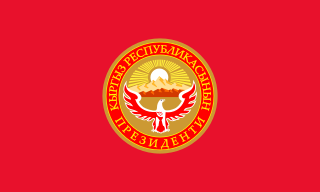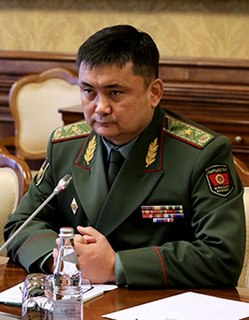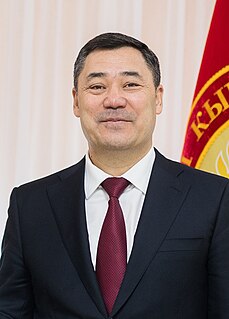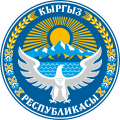
The history of the Kyrgyz people and the land now called Kyrgyzstan goes back more than 3,000 years. Although geographically isolated by its mountainous location, it had an important role as part of the historical Silk Road trade route. Turkic nomads, who trace their ancestry to many Turkic states such as the First and Second Turkic Khaganates, have inhabited the country throughout its history. In the 13th century, Kyrgyzstan was conquered by the Mongols; subsequently it regained independence but was invaded by Kalmyks, Manchus, and Uzbeks. In 1876, it became part of the Russian Empire, remaining in the USSR as the Kirghiz Soviet Socialist Republic after the Russian Revolution. Following Mikhael Gorbachev's democratic reforms in the USSR, in 1990 pro-independence candidate Askar Akayev was elected president of the SSR. On 31 August 1991, Kyrgyzstan declared independence from Moscow, and a democratic government was subsequently established.

The politics of Kyrgyzstan, officially known as the Kyrgyz Republic, takes place in the framework of a presidential system representative democratic republic, whereby the President is head of state and the Chairman of the Cabinet of Ministers is head of government. Executive power is exercised by the government. Legislative power is vested in both the government and parliament. The Economist Intelligence Unit rated Kyrgyzstan a "hybrid regime" in 2019.

Kyrgyzstan or the Kyrgyz Republic, is a landlocked country in Central Asia. Kyrgyzstan is bordered by Kazakhstan to the north, Uzbekistan to the west, Tajikistan to the south, and the People's Republic of China to the east. Its capital and largest city is Bishkek. It has a mountainous terrain.

The president of Kyrgyzstan officially the president of the Kyrgyz Republic, is the head of state and the head of government of the Kyrgyz Republic. The president directs the executive branch of the national government and is the commander-in-chief of the Kyrgyz military. The president also heads the National Security Council.

The chairman of the Cabinet of Ministers of Kyrgyzstan, formerly known as the Prime Minister of Kyrgyzstan chairs the Cabinet of Ministers of the Kyrgyz Republic.

The Social Democratic Party of Kyrgyzstan was a political party in Kyrgyzstan. Members formed the party on 1 October 1993, but did not register with the Justice Ministry until 16 December 1994. Abdygany Erkebaev served as the party's first chairman. Almazbek Atambayev replaced him on 30 July 1999. The majority of the party's membership is drawn from the country's entrepreneurs.

Almazbek Sharshenovich Atambayev is a Kyrgyz politician who served as the President of Kyrgyzstan from 1 December 2011 to 24 November 2017. He was Prime Minister of Kyrgyzstan from 17 December 2010 to 1 December 2011, and from 29 March 2007 to 28 November 2007. He served as Chairman of the Social Democratic Party of Kyrgyzstan (SDPK) from 30 July 1999 to 23 September 2011.

Sooronbay Sharipovich Jeenbekov is a Kyrgyz politician who served as the 5th President of Kyrgyzstan from 2017 until his resignation in 2020, following a week of protests. Prior to that he served as the Prime Minister of Kyrgyzstan from April 2016 to August 2017.

Presidential elections were held in Kyrgyzstan on 15 October 2017. Incumbent President Almazbek Atambayev was not allowed to run again because the constitution sets a single six-year term for the head of state. Eleven candidates registered for the race, and from this field Sooronbay Jeenbekov of the Social Democratic Party of Kyrgyzstan won more than 50% of the vote, avoiding a runoff. Following certification of the results on 30 October, Jeenbekov was inaugurated as President of Kyrgyzstan on 24 November.

Taalaibek Baryktabasovich Omuraliev is a Kyrgyz major general and a former Minister of Defense of Kyrgyzstan. He also served briefly as the Chief of the General Staff twice.

The Ala Archa State Residence is an official presidential residence in Bishkek, Kyrgyzstan. It is the current official home of the President of Kyrgyzstan Sadyr Japarov.

Parliamentary elections were held in Kyrgyzstan on 4 October 2020. The results showed that pro-government parties had won a supermajority of seats. The election was subsequently annulled by the Central Election Commission during the 2020 Kyrgyzstan protests.
Events in the year 2020 in Kyrgyzstan.

Chynybai Akunovich Tursunbekov was a Kyrgyz politician.

Sadyr Nurgozho uulu Japarov is a Kyrgyz politician who has served as the president of Kyrgyzstan since 28 January 2021. He had previously served as the acting prime minister of Kyrgyzstan in the 2020 interim government following the resignation of Sooronbay Jeenbekov on 15 October 2020 amidst electoral protests. Japarov also became acting president of Kyrgyzstan after Jeenbekov's resignation but resigned himself on 14 November 2020. On 10 January 2021, Japarov was elected president.

Snap parliamentary elections were held in Kyrgyzstan on 28 November 2021. They followed the annulment of the results of the October 2020 elections and the subsequent protests against the election's conduct. Seven parties passed the 5% threshold and will take up seats in the parliament. Turnout hit a record low at less than 35%.

Kanybek Abdouvassitovitch Isakov was a Kyrgyz politician and academic.
This is a list of individuals and events related to Kyrgyzstan in 2021.

Ulukbek Asamidinovich Maripov is a Kyrgyz politician who served as Chairman of the Cabinet of Ministers of Kyrgyzstan from 5 May 2021 to 12 October 2021. He was the first to serve in this position, serving in this position after the post of Prime Minister of Kyrgyzstan was abolished. Prior to being appointed prime minister Maripov had led the Kyrgyz Account Chamber.

The Social Democrats is a Kyrgyz social democratic political party founded by supporters of former President Almazbek Atambayev who quit the SDPK. After the conflict between Atambaev and the new president Sooronbai Jeenbekov emerged and deepened in 2018, Atambaev announced about ongoing attempt of the president Jeenbekov to raiderly seize the Social Democratic Party of Kyrgyzstan (SDPK), which he created back in the 90s and leaded.
























